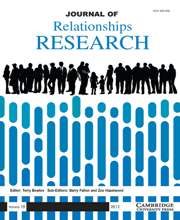Article contents
A Longitudinal Test of Relational Turbulence Theory
Published online by Cambridge University Press: 22 December 2020
Abstract
Relational turbulence theory (RTT) proposes causal relationships across cognitive, emotional and communicative variables. Although many tenets of this theory have been tested individually, there has not yet been a comprehensive, predictive examination of RTT. Using structural equation modelling, this study longitudinally tested several propositions and axioms of RTT. Results are largely in line with many of RTT's predictions. Time 1 relational uncertainty predicted time 2 biased cognitions. Time 1 facilitation from a partner predicted time 2 negative emotions. Negative emotions cross-sectionally related to both the enactment and valence of relational communication episodes. Relational turbulence theory's proposed feedback loop received partial support, such that time 1 communication valence (but not engagement) predicted time 2 partner uncertainty, relationship uncertainty and partner facilitation. Results are discussed in terms of theory expansion and refinement.
Information
- Type
- Research Article
- Information
- Copyright
- Copyright © The Author(s), 2020. Published by Cambridge University Press
References
- 1
- Cited by

